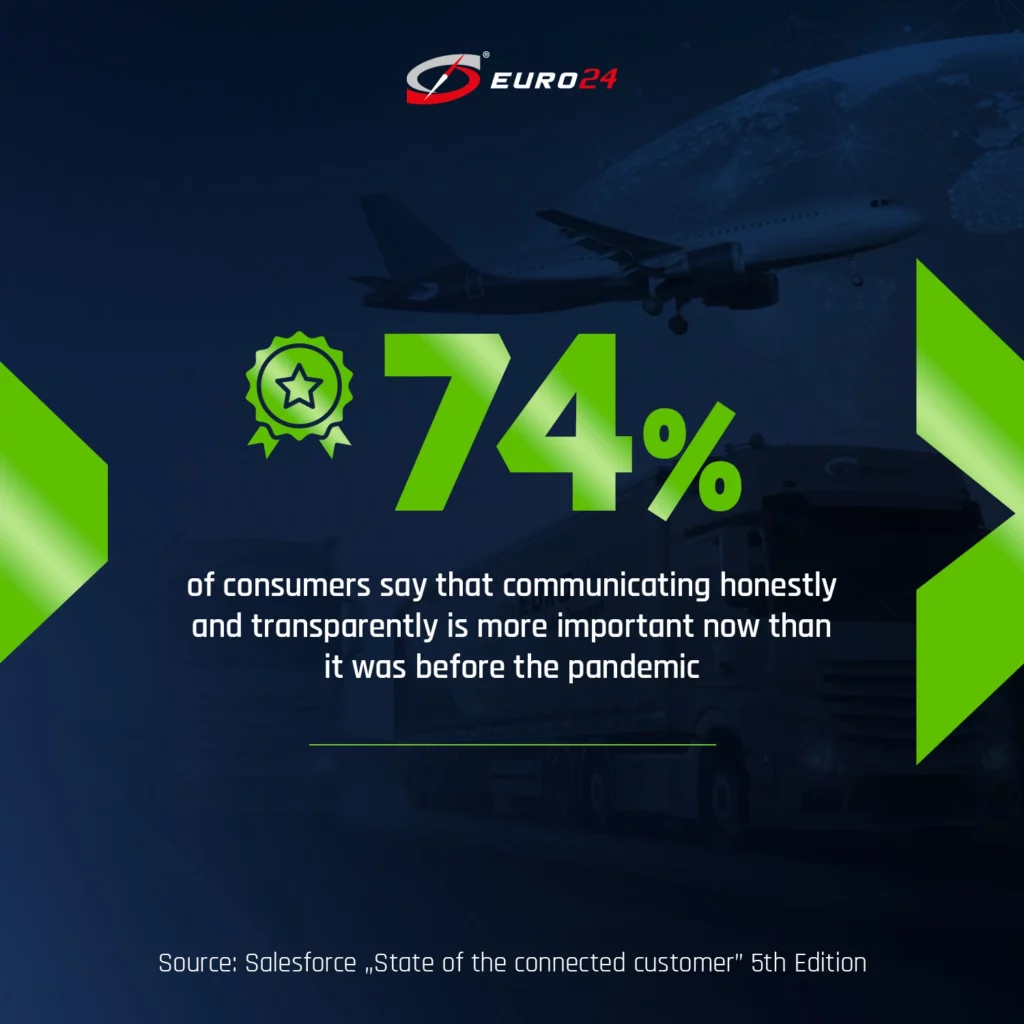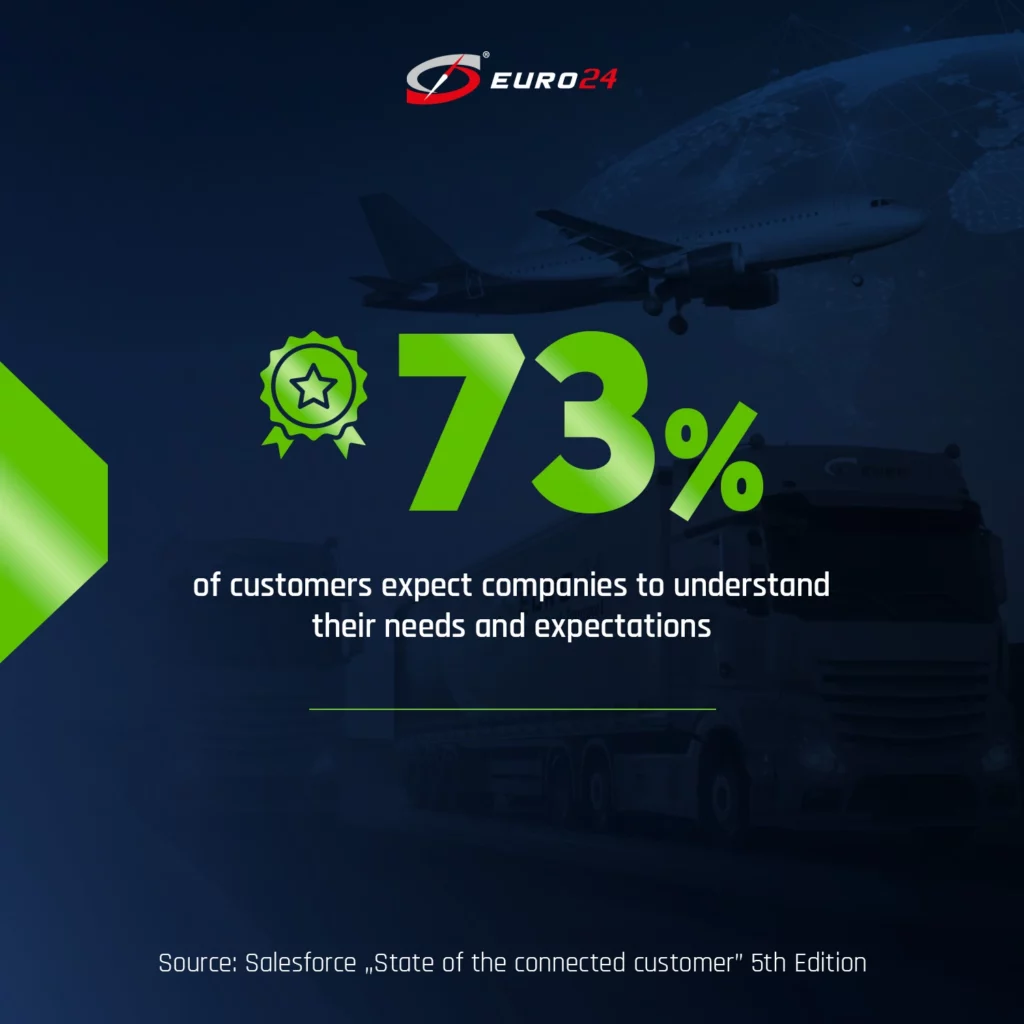Blog

How to manage tough talks with customers in the TSL industry?
In the TSL industry, where time is money and customer satisfaction is an undeniable key to success, every participant in the transport order process must be prepared for difficult conversations with clients. Sometimes things do not go according to plan, especially in such a dynamic and unpredictable industry, and the ability to manage crisis situations and conduct tough conversations becomes invaluable. So, how can one effectively navigate these communication bumps while maintaining professionalism and simultaneously caring for good customer relations? Below are a few key issues to consider and implement in your work.
1. Understanding the problem
It is important to delve into all aspects of the situation. A thorough understanding of what went wrong, the causes, and the potential further consequences will aid in building a case and presenting realistic solutions that our client expects. The fact that a mistake or error occurred does not have to doom the entire business relationship; the most important thing is finding a solution that is satisfactory. According to the Salesforce „State of the Connected Customer” report, as many as 88% of customers believe that trust is important in these times of economic uncertainty and climate change. Therefore, proper preparation for the conversation is not only protective armor but also a sign of professionalism that the client will surely appreciate, which may protect against violating the built trust.

2. Listening is key
Active listening is more than just silence while another person speaks; it involves attempting to understand the deeper issues and feelings of the client. The client expressing their concerns and frustrations about the problem should primarily be understood. Such an approach can not only help resolve the current issue but also strengthen the relationship, because, after all, relationships are key in this industry.
3. Composure and professionalism
Regardless of how difficult the situation is, it is important not to get carried away by emotions. This is not always easy, but it is particularly crucial in transportation. Maintaining a professional tone and composure during the most tense moments are perceived as signs of competence and stability.

4. Transparency in communication
Clearly expressing your thoughts and not hiding important facts from the client is fundamental. If an error has occurred on the part of the company, openly admitting to it and explaining the steps that will be taken to rectify the damage are essential. Clients value honesty and are more inclined to cooperate when they feel that the company is sincere, even if mistakes happen occasionally or there are issues that often aren’t directly caused by the company. It’s important to remember that random situations in transport are common. However, preventive actions can be taken and procedures implemented that clearly list the steps to be taken in various situations. This can significantly reduce stress levels among employees who face such difficult conversations.
Quick and transparent communication of errors and corrective plans is key to maintaining customer trust, as 74% of them state that honest and clear communication is much more important now than before the pandemic. This also applies to communication at the start of creating an order. Companies that tried to contact potential clients within an hour of receiving an inquiry were nearly seven times more likely to qualify a lead than those that tried to contact a client even an hour later—and over 60 times more likely than companies that waited 24 hours or longer. Whether it’s the beginning of the order process or communication during its duration, a swift and specific response is often worth its weight in gold.


5. Negotiations and seeking compromise
Considering various scenarios and solutions to a problem should occur immediately after its detection. In many cases, an ideal solution is not possible for various reasons. It is important to find a solution that, although partially satisfying the client, does not destructively impact the company’s operations. Creativity in seeking compromise can prove to be crucial. According to the Deloitte report „Customer Service Excellence 2023,” 45% of customers believe that resolving the problem on the first contact is key. This is the most important factor for customers, with an importance rating of 3.83 compared to other aspects of customer service according to this report.

6. Documenting conversations
All agreements, promises, and even the course of the conversation should be thoroughly documented. Such records can prove invaluable for any subsequent claims, resolving misunderstandings, or in analyzing what can be improved in the future. Confirmation via email or in another written form always provides a secure record of what has been agreed upon verbally. In transport, where stakes are really high and the goods are valuable, such documentation is truly worth its weight in gold.

7. Analysis and learning
Every difficult conversation with a client is an opportunity for learning and development. It is important not to be discouraged, but rather to draw conclusions and work on appropriate techniques for dealing with such situations. By analyzing what went wrong and which actions yielded positive results, a company can improve its processes to avoid similar issues in the future.
Analysis
Conclusions
Learning
8. Actions after the conversation
After concluding a conversation, it is important to summarize the agreements with the client and define the next steps. It is also essential to ensure that all promised actions are carried out within the agreed timelines. Prompt and effective action after a difficult conversation can significantly improve the client’s perception of the company. According to the Salesforce report „State of the Connected Customer,” as many as 73% of customers expect companies to understand their needs and expectations. Therefore, it is crucial that the solutions promised are realistic to fulfill, and their implementation time as quick as possible, so the consumer feels that their needs are a priority for us.

Conducting difficult conversations with clients in the transportation industry requires not only communication skills but also a deep understanding of the industry’s specifics and flexibility in action. By keeping these principles in mind, one can effectively transform potential crises into opportunities for the company to demonstrate its value and reliability.
Have you got questions?
Drop us a line. Together, we’ll identify solutions for your transport requirements.
Arrange a „virtual coffee” with our Sales Representative and find out how we can ensure the collaboration comfort you’re after. Eliminat the stress associated with transport. Our staff carefully identify your transport priorities to craft a bespoke offer.
Discover how we can bolster your business.
GET YOUR TRANSPORT QUOTE AS SOON AS POSSIBLE >>

Sources:
https://hbr.org/2011/03/the-short-life-of-online-sales-leads

